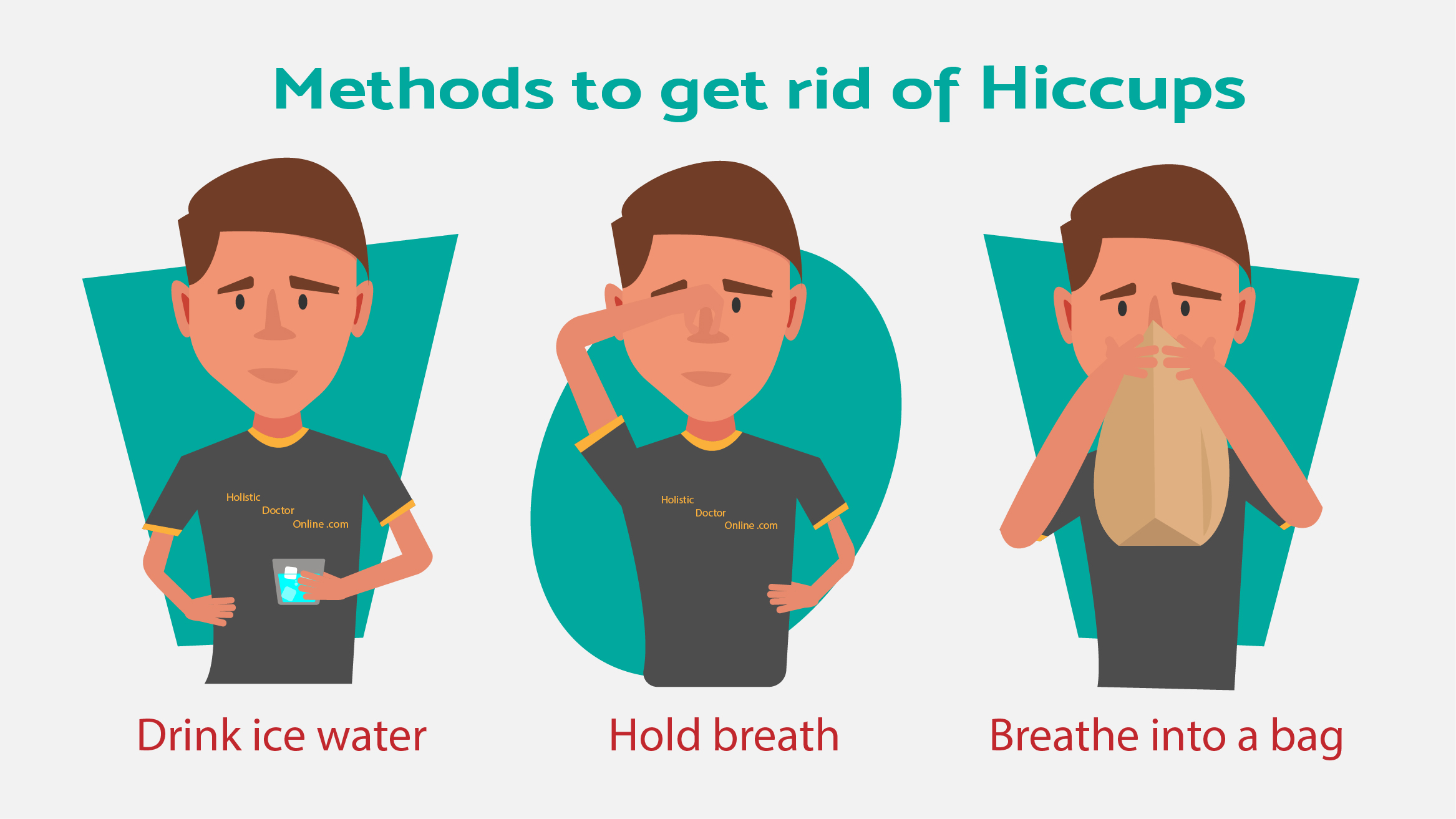Hiccups are a common but often frustrating occurrence. They can strike out of nowhere and, though usually harmless, can be an annoyance when they persist. Whether you’re in a meeting, a social setting, or just trying to relax, hiccups can disrupt your day. Fortunately, there are many ways to stop hiccups fast, and most remedies involve simple, accessible techniques.
In this guide, we’ll explore what causes hiccups, effective remedies to eliminate them, and ways to prevent them in the future.
| HICCUPS OVERVIEW | DETAILS |
| What They Are | Involuntary contractions of the diaphragm causing a “hic” sound due to the sudden closure of vocal cords. |
| What They Sound Like | A sharp “hic” or “hick” sound that repeats at regular intervals. |
| How They Feel | Brief, mild spasm or jerk in the chest or throat, sometimes uncomfortable. |
| How Long They Last | Typically lasts a few minutes but can last hours or, in rare cases, days (chronic hiccups). |
| Who They Affect | Affects people of all ages, including infants. Men are more prone to chronic hiccups. |
| What They Can Be Caused By | Eating or drinking too quickly, overeating, carbonated drinks, temperature changes, swallowing air, emotional triggers, and alcohol. Rarely, they can indicate medical conditions like GERD or nerve issues. |
What Causes Hiccups?
Hiccups occur due to involuntary contractions of the diaphragm—the muscle that separates your chest from your abdomen and plays a crucial role in breathing. Each contraction is followed by the sudden closing of your vocal cords, which produces the characteristic “hic” sound.
Hiccups can be triggered by several factors, including:
- Eating too quickly or too much: This can cause your stomach to expand and irritate the diaphragm.
- Sudden changes in temperature: For example, drinking a hot beverage followed by a cold one.
- Carbonated drinks: Fizzy drinks can increase gas in the stomach, leading to hiccups.
- Stress or excitement: Emotional changes can sometimes trigger the reflex that causes hiccups.
- Swallowing air: This can happen when chewing gum, sucking on hard candy, or drinking through a straw.
While most hiccups go away on their own after a few minutes, persistent hiccups can last for hours or even days, requiring more targeted solutions.
How to Get Rid of Hiccups Quickly: Top Remedies
1. Hold Your Breath
Holding your breath is one of the most popular and effective remedies for hiccups. By holding your breath, you increase the amount of carbon dioxide in your bloodstream, which can help calm the diaphragm and stop the spasms causing your hiccups.
How to do it:
- Take a deep breath and hold it for as long as you comfortably can.
- Exhale slowly.
- Repeat if necessary until the hiccups stop.
2. Sip Cold Water
Drinking cold water can help soothe the nerves responsible for the hiccup reflex. It also distracts your body, causing your diaphragm to relax.
How to do it:
- Slowly sip cold water, taking small gulps to avoid swallowing too much air.
- Alternatively, you can gargle with cold water for a similar effect.
3. Swallow a Teaspoon of Sugar
This age-old remedy works by stimulating the vagus nerve, which may reset the diaphragm’s contractions and stop hiccups.
How to do it:
- Take a teaspoon of granulated sugar.
- Swallow it dry, without water.
- Wait for a few minutes to see if the hiccups stop.
4. Use the Paper Towel Trick
Drinking water through a paper towel creates resistance, forcing your diaphragm to work harder, which can interrupt the hiccup cycle.
How to do it:
- Place a paper towel over a glass of water.
- Drink the water through the towel.
- The extra effort required to suck the water through the towel can help stop your hiccups.
5. Stimulate the Back of Your Throat
You can stop hiccups by activating your gag reflex. While this may sound uncomfortable, it can help relax the diaphragm and stop hiccups quickly.
How to do it:
- Stick a clean finger down your throat to lightly stimulate your gag reflex.
- Be gentle, and stop if it feels too uncomfortable.
6. Pull on Your Tongue
Pulling on your tongue can stimulate the nerves and muscles in your throat, which may help ease diaphragm spasms and get rid of hiccups.
How to do it:
- Gently hold the tip of your tongue with a clean tissue or cloth.
- Pull it forward once or twice.
7. Breathe Into a Paper Bag
Breathing into a paper bag can help increase the levels of carbon dioxide in your bloodstream, which may relax your diaphragm and end the hiccup reflex.
How to do it:
- Take a small paper bag and hold it over your mouth.
- Inhale and exhale into the bag for a few breaths, but stop if you feel lightheaded.
8. Apply Pressure to Your Diaphragm
Applying pressure to your diaphragm, located just below your rib cage, can help relax the muscle and stop hiccups.
How to do it:
- Sit down and lean forward.
- Press gently but firmly on the area just below your ribs with your hand.
- Hold this position for 30-60 seconds.
Other Tips for Getting Rid of Hiccups
9. Eat a Spoonful of Peanut Butter
Peanut butter has a sticky consistency that can interfere with your breathing and swallowing patterns, which may interrupt the hiccup reflex.
How to do it:
- Take a spoonful of peanut butter.
- Let it slowly melt in your mouth before swallowing.
10. Ice Your Throat
Applying something cold, like ice, to your throat can stimulate the vagus nerve and help reset the hiccup reflex.
How to do it:
- Hold an ice cube against your throat or suck on a piece of ice.
11. Try Drinking Upside Down
Changing your body’s position can sometimes help stop hiccups by resetting the diaphragm.
How to do it:
- Fill a glass of water.
- Bend over at the waist and drink the water from the opposite side of the glass.
How to Prevent Hiccups
While hiccups are often spontaneous, you can take steps to reduce the likelihood of getting them in the future.
- Eat slowly: Eating too quickly or overeating can irritate the diaphragm, so pace yourself.
- Avoid carbonated beverages: These drinks can cause gas buildup, which may lead to hiccups.
- Stay calm: Stress or excitement can trigger hiccups, so try to manage your emotions effectively.
- Limit alcohol consumption: Alcohol can relax the muscles in your esophagus, which can contribute to hiccups.
- Chew your food properly: Eating smaller bites and chewing thoroughly can prevent swallowing air, which is a common hiccup trigger.
When to See a Doctor for Hiccups
Most hiccups go away within a few minutes or hours. However, if you experience prolonged hiccups lasting more than 48 hours, it’s essential to consult a healthcare professional. Persistent hiccups can be a sign of an underlying medical condition, such as:
- Gastroesophageal reflux disease (GERD): Acid reflux can irritate the diaphragm.
- Nerve damage: Conditions affecting the nerves that control the diaphragm can cause chronic hiccups.
- Central nervous system disorders: Issues like meningitis, stroke, or multiple sclerosis may affect the hiccup reflex.
Your doctor can assess your symptoms and recommend treatment options if necessary.
FAQs
1. How long do hiccups usually last?
Ans – Hiccups typically last only a few minutes. In rare cases, they can last hours or even days, but such prolonged hiccups may require medical attention.
2. Is it dangerous to have hiccups for a long time?
Ans – While occasional hiccups are harmless, hiccups that persist for more than 48 hours can indicate an underlying medical issue and should be checked by a doctor.
3. Can drinking water upside down stop hiccups?
Ans – Yes, drinking water upside down can sometimes help stop hiccups by altering your body’s position and encouraging the diaphragm to reset.
4. Why do I get hiccups after eating?
Ans – Eating too quickly or too much can irritate the diaphragm, leading to hiccups. Other triggers may include drinking carbonated beverages or swallowing air while eating.
5. Does sugar stop hiccups?
Ans – Yes, swallowing a teaspoon of sugar can stimulate the vagus nerve, which may help stop hiccups by resetting the diaphragm’s contractions.
6. Are there any medications to treat persistent hiccups?
Ans – For chronic hiccups, doctors may prescribe medications such as muscle relaxants or antipsychotics. These drugs help relax the diaphragm and reduce hiccup spasms.
Conclusion
Hiccups are a minor but frustrating inconvenience that most people experience at some point. While they usually resolve on their own, knowing how to get rid of hiccups quickly can save you from uncomfortable situations. Whether you prefer holding your breath, sipping cold water, or trying an unconventional remedy like peanut butter, there’s a solution for everyone.
If you frequently get hiccups or experience prolonged bouts, consulting a healthcare professional may help you uncover the underlying cause and get appropriate treatment.



